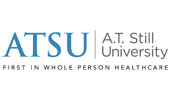
Cultural Proficiency
Challenge
In 2011, A.T. Still University of Health Sciences (ATSU) received recommendations from the Higher Learning Commission (HLC) regarding diversity. A diversity initiative task force was convened, which issued a report in November 2012. Included among the specific recommendations was:
Hire a diversity affairs officer, who would:
- Develop and enhance programs encouraging diversity and inclusion;
- Develop diversity training for faculty and staff;
- Foster cultural diversity and sensitivity within ATSU programs, departments, and divisions;
- Work cooperatively with institutional advancement for scholarship pools; and
- Create a strategic plan for diversity.
Actions
The inaugural diversity director was hired in September 2013 and promoted to associate vice president of diversity and inclusion in 2016. ATSU formed an Advisory Council on Diversity in January 2014, who developed the 2015-20 diversity strategic plan. Cultural proficiency, diversity, and inclusion is a theme within the University’s 2016-2020 Strategic Plan, which allocated substantial funding.
Cultural proficiency (a way of being, enabling organizations and individuals to respond appropriately to different cultural settings) allows more self-reflective initiatives regarding presence, posture, process, practices, and policies to nurture culturally responsive interactions.
A University-wide Comprehensive Cultural Proficiency Climate Study was conducted in 2016-17. As a result, more culturally centered marketing materials were developed, a diversity scholarship endowment initiated, gender-neutral restrooms constructed, and military/reflection/prayer spaces added, and a diversity training course incorporated in the hiring policy.
Outcomes
In 2018, the HLC reaccreditation site visit yielded no recommendations; however; site reviewers commended the University for diversity and adherence to its mission. ATSU is the first graduate health professions university to receive the Higher Education Excellence in Diversity award consecutively (2017-19). The University has six articulation agreements with historically black colleges & universities, received federal funding for diversity-related initiatives, and increased diversity among the Board of Trustees, leadership, students, and employees.
Contact
Clinton Normore, Associate Vice President of Diversity and Inclusion
Kim Perry, Associate Vice President of Strategic Partnerships